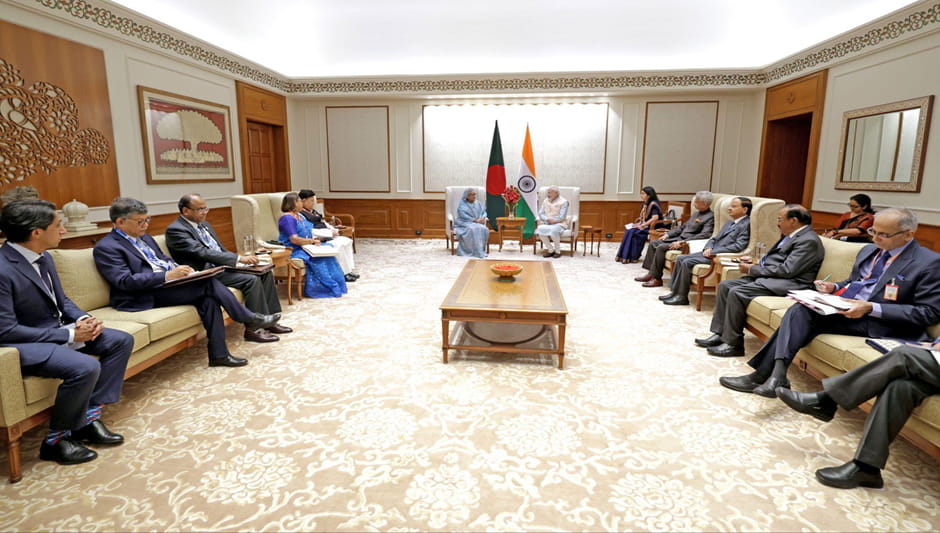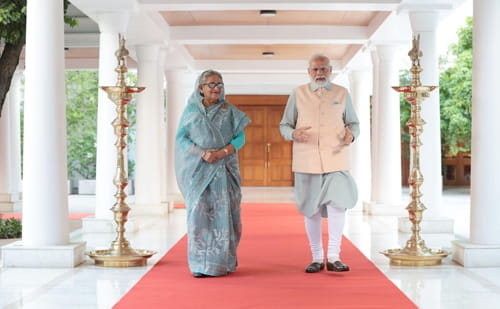
India-Bangladesh bilateral in New Delhi, September 2023 | Press Information Bureau
India's delicate position amidst Bangladesh’s #IndiaOut scenario is noteworthy. On the one hand, it must maintain its strategic and economic interests in Bangladesh; and on the other, it faces the challenge of addressing anti-India sentiments and accusations of interference. The Bangladesh Nationalist Party’s utilisation of media outlets to propagate its agenda complicates the situation further, making it a multifaceted issue that involves regional geopolitics, national security, and the internal political landscape of Bangladesh.
Background
The #IndiaOut campaign has emerged as a significant socio-political movement in Bangladesh, gaining momentum following the contentious general elections in January 2024. The ruling Awami League (AL) secured a controversial victory, extending its rule for a fourth consecutive term. Spearheaded primarily by opposition parties, notably the Bangladesh Nationalist Party (BNP), this campaign resonates with sentiments observed elsewhere, such as in the Maldives.1 Critics have accused the BNP of using #IndiaOut to deflect attention away from their involvement in arson campaigns targeting civilians and police during the January election campaign.
At the core of the #IndiaOut campaign lie allegations of undue Indian influence in Bangladeshi politics, particularly perceived support for the AL government led by Prime Minister Sheikh Hasina. Critics argue that India's involvement has undermined Bangladesh's democratic processes and sovereignty. This sentiment is reinforced by concerns over India’s interference in various domestic affairs of Bangladesh, including election manipulation and the appointment of key administrative positions. However, the BNP and Western media parroting these claims have yet to provide evidence to support their theories.2
The relations between India and Bangladesh have been targeted in the past. The Economist magazine once said the Awami League government came to power in 2009 with “bags of Indian cash.”3 This caused a major scandal at the time. Later, The Economist was highlighted for being a vehicle for providing public relations to the highest bidder in an undercover exposé by Harper’s Magazine in the USA.4
Ken Silverstein exposed how lobbyists use The Economist for influence operations in Washington, DC: “Another option, he explained, would be to pay Roll Call and The Economist to host a Turkmenistan event. It would be costlier than the think-tank route, perhaps around $25,000, but in compensation, we would have tighter control over the proceedings, plus gain ‘the imprimatur of a respected third party.’”5 Later, The Economist ran stories and undercover exposés attacking Bangladesh’s Awami League and India. Cassidy & Associates, a hefty lobbying firm in Washington DC, was one of the main targets of Silverstein’s exposé. Their client was Jamaat-e-Islami Bangladesh. The Economist was also a vehicle for the ‘Skypegate’ scandal in Bangladesh.6
The allegation of Indian involvement in Bangladesh politics is used and abused by external actors to cause problems. Additionally, the #IndiaOut campaign advocates for boycotting Indian products, reflecting broader public discontent over issues like border killings by Indian forces, unresolved water-sharing disputes, and a significant trade deficit with India perceived as detrimental to Bangladesh's economic independence.7 Drawing parallels with the campaign in the Maldives, the #IndiaOut campaign in Bangladesh utilises nationalism and anti-foreign sentiment to mobilise support. However, it faces complex challenges due to the deep economic and geopolitical ties between India and Bangladesh, complicating the feasibility of complete disengagement from Indian imports and influence.
Key Figures Behind the Campaign
While the BNP and its leaders such as Tarique Rahman have been prominent in promoting the #IndiaOut campaign, other significant figures and groups have also played crucial roles in its formation and propagation.
Pinaki Bhattacharya has emerged as a key influencer in the #IndiaOut campaign. A well-known social media activist and political commentator based in Paris, France, Bhattacharya has been vocal about his opposition to perceived Indian interference in Bangladesh. His critiques and analyses, widely shared on social media platforms, have helped shape public opinion and bring attention to the campaign. Bhattacharya's involvement highlights the role of social media in modern political movements, where influencers can galvanise public sentiment and mobilise grassroots support.8
Nurul Haque Nur, a prominent BNP ally, has also been instrumental in the campaign. As a leading figure in public rallies and protests, Nur has been a vocal advocate for reducing Indian influence in Bangladesh's political and economic spheres.9 His speeches and writings often emphasise themes of national sovereignty and economic independence, resonating with a broad segment of the Bangladeshi population. He has also been openly anti-Hindu. Nur has a record of trying to denigrate and humiliate Hindus in Bangladesh.10
Nur is the President of Gono Odhikar Parishad, a party aligned with the opposition, and has actively supported the #IndiaOut campaign. This organisation, through its protests and rallies, has amplified the campaign’s message and mobilised support from various segments of society. The Parishad's activities demonstrate the collaborative nature of the campaign, which draws support from multiple groups united by a common cause.
Allegations of Violence and Destabilisation
The BNP leadership, including senior figures operating from abroad, has faced accusations of employing violent tactics to destabilise the region.11 Suspicions abound that BNP leaders have backed arson campaigns and other violent activities as part of broader political strategies aimed at sowing instability and pressuring the incumbent government. These actions are intended to demoralise law enforcement and intimidate the government into concessions.12
Reports suggest that the BNP's alleged involvement in arson attacks serves as a means to coerce governmental change when traditional electoral or peaceful protest methods are deemed ineffective or obstructed by what the BNP perceives as an undemocratic regime. High-profile incidents, such as the sabotage of trains and public transport, have been directly linked to directives from the BNP's central leadership, with law enforcement officials citing evidence from surveillance and confessions implicating the party's leaders.13
The BNP’s boycott campaign has led to them expelling party members who want to participate in the democratic process.14 The BNP is effectively throttling democracy. Its two-track approach of boycotting elections while planning for a violent uprising pushes the incumbent government into direct confrontation. Furthermore, senior BNP figures, including those operating abroad, have been accused of orchestrating sabotage activities resulting in civilian casualties. These actions, reportedly orchestrated not only by the BNP's central command but also by local operatives, align with the party's broader political objective of destabilising the current government to effect a change in power or policy.15
Both domestically and internationally, these violent actions have been widely condemned for their detrimental impact on public safety and the democratic process in Bangladesh. Many analysts speculate that the BNP has employed the #IndiaOut campaign to divert attention from their alleged involvement in arson attacks.

India’s PM Modi and Bangladesh’s PM Hasina meet in New Delhi, September 2020 | Press Information Bureau
Is Bangladesh’s Opposition a Threat to Regional Security and India?
The Bangladesh Nationalist Party (BNP) has faced scrutiny over its alleged connections with Harkat-ul-Jihad al-Islami Bangladesh (HuJI-B), a designated terrorist organisation involved in various acts of violence, including bombings and attacks in Bangladesh.16 Here are the key aspects of this relationship:
1. Alleged Political Support and Protection: Reports suggest that during the BNP's tenure in power, there were instances of implicit support or neglect of HuJI-B activities. Accusations include the BNP-Jamaat government's failure to take decisive action against the militant group, enabling its operations within Bangladesh.17
2. Allegations of Direct Involvement: Some accusations go further, alleging direct links between certain BNP leaders and HuJI-B. These claims range from facilitating political violence to involvement in terrorism, with suggestions of using HuJI-B to exert political pressure or target opposition figures. These claims were tested and proved in a Dhaka court during a lengthy national security case. HUJI-B’s Mufti Hannan and senior national security figures confessed that senior BNP figures were actively involved in terrorism against their rivals.18
3. Legal and Judicial Proceedings: Over the years, several BNP leaders have faced legal proceedings over their alleged connections with HuJI-B. These cases typically involve charges related to terrorism.19
4. International Concerns: International bodies and foreign governments have expressed concern over these alleged connections, citing potential implications for regional security and the global fight against terrorism.
Key BNP figures suspected of ties with HuJI-B include:
Abdul Salam Pintu: Former Deputy Minister of Education implicated in cases related to terrorist activities, notably the 2004 grenade attack on an Awami League rally.20
Lutfozzaman Babar: Former State Minister for Home Affairs convicted in connection with the same grenade attack, seen as part of a broader pattern of collusion with militant groups. Babar was also involved in the effort to flood India with Chinese weapons and explosives. The national security scandal is known as the Chittagong Arms Haul.21
Tarique Rahman: Senior vice-chairman of BNP, widely believed to have overseen a network within Hawa Bhaban with contacts with militant groups like HuJI-B and JMB.22 Former-United States Ambassador to Bangladesh, James F. Moriarty said Tarique Rahman was a symbol of, “kleptocratic government and violent politics,” in Bangladesh. Senior US embassy staff in Dhaka recommended blocking Tarique’s entry into the United States. They believe Tarique was, “guilty of egregious political corruption that has had a serious adverse effect on US national interests”, namely the stability of democratic institutions and US foreign assistance goals.”23
Conclusion
The #IndiaOut campaign highlights the complex dynamics of Bangladesh’s domestic politics, where allegations of foreign interference and nationalist sentiments intersect. While the campaign underscores legitimate concerns about national sovereignty and economic independence, it is also mired in allegations of violence and destabilisation tactics by opposition forces. The BNP’s historical connections with militant groups and its alleged involvement in violent activities raise significant security concerns, not only for Bangladesh but also for regional stability.
External forces in Pakistan and China have expressed their desire to influence separatists in India. Bangladesh is an integral part of this dynamic. The weapons recovered in the Chittagong Arms Haul were from China with Pakistan’s Inter-Services Intelligence (ISI) acting as the middleman. Terrorists leaders, such as Parash Baruah, from the United Liberation Front of Assam (ULFA) were to be the recipients of the arms. Baruah is reportedly being protected by China’s Ministry of State Security (MSS) and lives in Yunnan province, China.24
India's delicate position in this scenario is noteworthy. On one hand, it must maintain its strategic and economic interests in Bangladesh; on the other, it faces the challenge of addressing anti-India sentiments and accusations of interference. The BNP’s utilisation of media outlets to propagate its agenda complicates the situation further, making it a multifaceted issue that involves regional geopolitics, national security, and the internal political landscape of Bangladesh.
While the #IndiaOut campaign aims to address legitimate grievances, its association with violent and destabilising tactics by the BNP undermines its credibility. The ongoing political strife in Bangladesh, influenced by historical, economic, and geopolitical factors, continues to pose significant challenges to the region’s stability and security.
(Exclusive to NatStrat)
Endnotes: